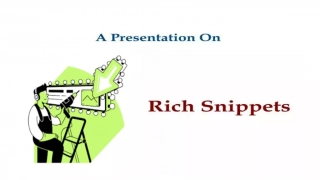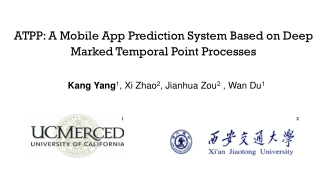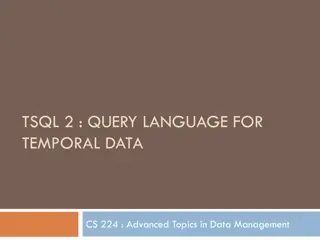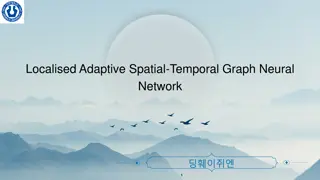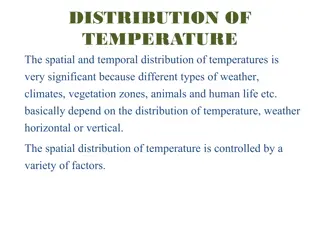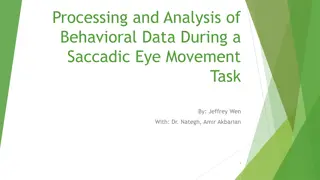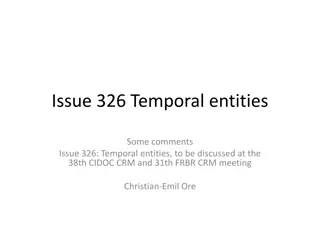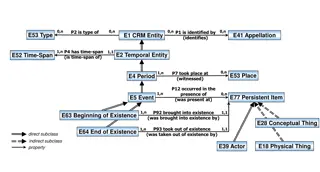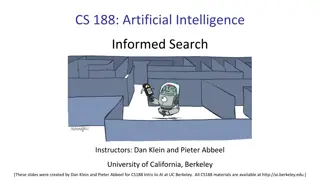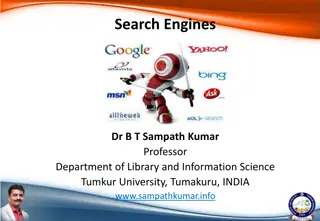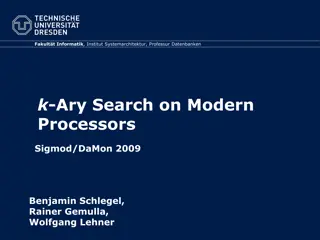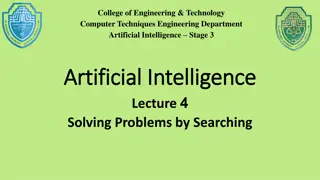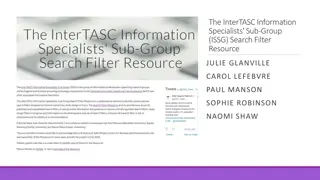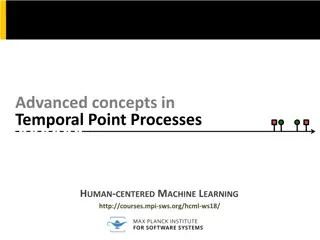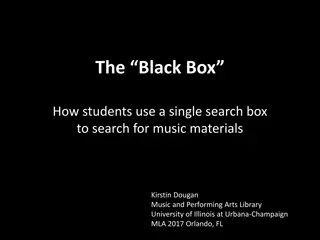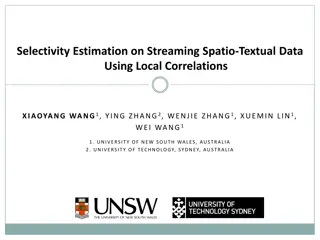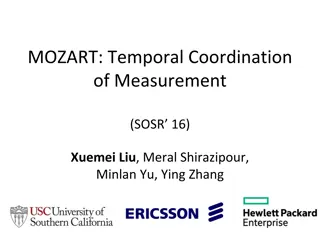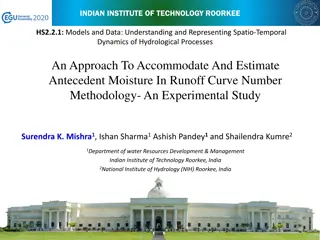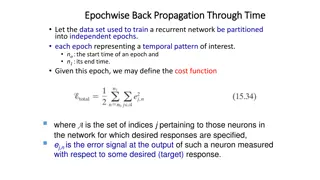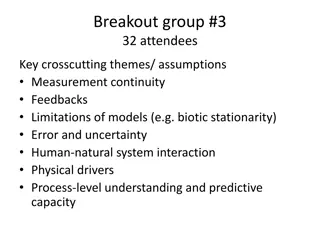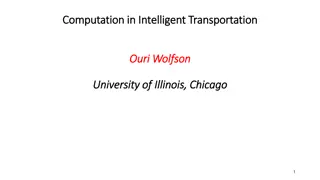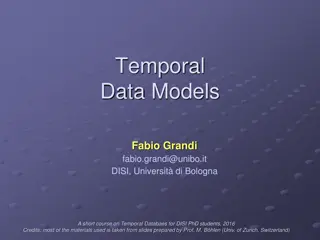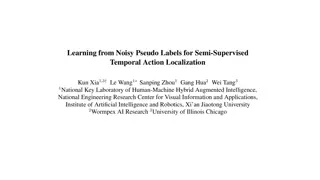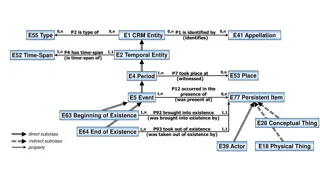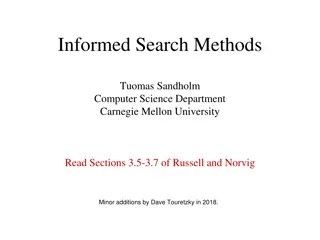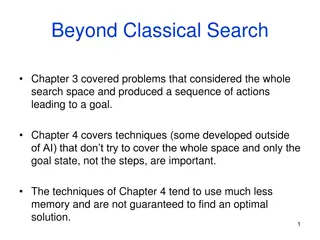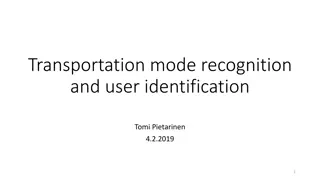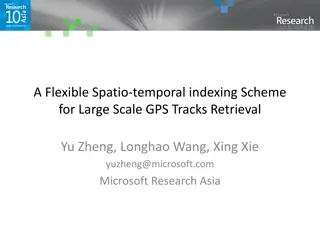Stand Out in Search: The Art of Rich Snippet Optimization
\nRich snippets are enhanced search results that provide additional information beyond traditional titles and meta descriptions. Achieved through structured data markup, such as JSON-LD or Microdata, rich snippets offer a more detailed preview of webpage content in search engine results. Examples in
1 views • 8 slides
Semi-Supervised Credit Card Fraud Detection via Attribute-Driven Graph Representation
Explore a novel approach for detecting credit card fraud using a semi-supervised attribute-driven graph representation. The technique leverages temporal aggregation and attention layers to automatically unify heterogeneous categorical attributes and detect fraudulent transactions without label leaka
1 views • 23 slides
Deep Reinforcement Learning for Mobile App Prediction
This research focuses on a system, known as ATPP, based on deep marked temporal point processes, designed for predicting mobile app usage patterns. By leveraging deep reinforcement learning frameworks and context-aware modules, the system aims to predict the next app a user will open, along with its
0 views • 24 slides
Efficient Resource Mobilization and Management Strategies by Dr. Abraham Maliet Mamer
This content discusses efficient resource mobilization and management strategies, emphasizing the importance of understanding the typical cycle of resource regime, defining resources, identifying resources, and mobilizing resources effectively. It provides insights into resource allocation methodolo
1 views • 12 slides
Understanding Temporal Data Management in TSQL Queries
Explore the realm of temporal data in TSQL queries, delving into the concepts of valid time and transaction time, different types of relations like snapshot and bi-temporal, and the significance of time dimensions in database management. Learn how temporal databases support time-related queries for
6 views • 41 slides
Localised Adaptive Spatial-Temporal Graph Neural Network
This paper introduces the Localised Adaptive Spatial-Temporal Graph Neural Network model, focusing on the importance of spatial-temporal data modeling in graph structures. The challenges of balancing spatial and temporal dependencies for accurate inference are addressed, along with the use of distri
3 views • 19 slides
Understanding the Spatial and Temporal Distribution of Temperature
The spatial and temporal distribution of temperatures plays a crucial role in determining weather patterns, climates, vegetation zones, and wildlife habitats. Factors such as latitude, altitude, distance from the coast, and prevailing winds influence the distribution of temperature both horizontally
2 views • 5 slides
Behavioral Data Analysis During Saccadic Eye Movement Task
Visual systems utilize saccades to focus on objects, impacting temporal perception. This study explores the effects of saccades and stimulus location on perceived time, presenting findings from an experiment on temporal perception mapping with fixed visual duration. The method of psychometric functi
0 views • 12 slides
Understanding Search Procedures and Warrants in Legal Context
Search procedures play a crucial role in law enforcement, allowing authorities to explore, probe, and seek out hidden or suspected items. This comprehensive outline covers the meaning of search, locations where searches are conducted, objects searched for, legal definitions of search of a place, sea
0 views • 11 slides
Discussion on Temporal Entities and Simultaneity in CIDOC CRM Meeting
Temporal entities and the modeling of simultaneity in CIDOC CRM are under discussion at the upcoming meeting. The current approach considers the cardinality of certain relations, aiming to streamline the representation of time-spans and spacetime volumes. The evolving perspectives on the spatial com
3 views • 5 slides
Understanding Temporal and Spatial Information Models
This content delves into the intricacies of temporal and spatial information models, covering concepts such as existence, presence, and spatiotemporal relationships. It explores how entities are identified, events are witnessed, and durations are defined within these models. The interplay between ti
3 views • 9 slides
Challenges of Arctic Offshore Search and Rescue Activities
The Arctic region poses unique challenges for Search and Rescue (SAR) operations, requiring temporal collaboration, resource coordination, and quick adaptation to changing conditions. Activities in 2018 focused on enhancing SAR capabilities through game-based learning. Publications and outreach effo
0 views • 7 slides
Covert Visual Search and Effective Oculomotor Range Constraints
The study delves into whether covert visual search is biologically limited by the Effective Oculomotor Range (EOMR), exploring neuropsychological evidence, eye movement studies, and participant measurements. It investigates the impact on visual search tasks, including color, orientation, and conjunc
1 views • 15 slides
Understanding Informed and Uninformed Search Algorithms in Artificial Intelligence
Delve into the world of search algorithms in Artificial Intelligence with a focus on informed methods like Greedy Search and A* Search, alongside uninformed approaches such as Uniform Cost Search. Explore concepts like search problems, search trees, heuristic functions, and fringe strategies to comp
0 views • 69 slides
Understanding Search Engines and Their Importance
Search engines, such as Google, play a crucial role in retrieving information from the web, providing access to a vast document collection, and helping users find what they need quickly and efficiently. They come in different types like robot-driven and meta search engines, each serving specific pur
1 views • 23 slides
k-Ary Search on Modern Processors
The presentation discusses the importance of searching operations in computer science, focusing on different types of searches such as point queries, nearest-neighbor key queries, and range queries. It explores search algorithms including linear search, hash-based search, tree-based search, and sort
0 views • 18 slides
Solving Problems by Searching in Artificial Intelligence: Uninformed Search Strategies
In the field of Artificial Intelligence, solving problems through searching is essential. Uninformed search strategies, also known as blind search, involve exploring the search space without any additional information beyond what is provided in the problem definition. Techniques such as Breadth-Firs
1 views • 26 slides
Enhancing Search Filters for Evidence Synthesis: The ISSG Search Filter Resource
Introduction: The ISSG Search Filter Resource provides methodological search filters for identifying studies of specific designs, aiding in evidence synthesis and guideline development. The site is produced through monthly searches in databases like CINAHL, Embase, and MEDLINE. It offers filters for
1 views • 8 slides
Understanding Advanced Concepts in Temporal Point Processes for Human-Centered Machine Learning
Explore advanced concepts in temporal point processes through the lens of human-centered machine learning. Topics include marked temporal point processes, independent identically distributed marks, dependent marks, and mutually exciting marks. Learn about stochastic dynamical systems such as the Sus
0 views • 8 slides
Understanding Search Patterns for Music Materials in Libraries
Exploring how students search for music materials using a single search box, this study investigates if the nature of music materials influences search patterns compared to other subjects. It also evaluates the effectiveness of tools like federated search and discovery layers in facilitating searche
0 views • 25 slides
Selectivity Estimation on Streaming Spatio-Textual Data Using Local Correlations
This research focuses on efficient selectivity estimation on streaming spatio-textual data by incorporating local correlations. It addresses the challenge of estimating the number of objects in a query region with specific keywords in real-time. The study proposes novel approaches like ASP-tree and
0 views • 29 slides
Heuristic Search Algorithms in Artificial Intelligence
In the realm of artificial intelligence, heuristic search algorithms play a pivotal role in efficiently navigating large search spaces to find optimal solutions. By leveraging heuristics, these algorithms can significantly reduce the exploration of the search space and guide agents towards the goal
0 views • 14 slides
Energy-Efficient GPU Design with Spatio-Temporal Shared-Thread Speculative Adders
Explore the significance of GPUs in modern systems, with emphasis on their widespread adoption and performance improvements over the years. The focus is on the need for low-power adders in GPUs due to high arithmetic intensity in GPU workloads.
0 views • 46 slides
Temporal Coordination of Measurement in Data Centers
Measurement plays a crucial role in data centers for fault diagnosis, traffic engineering, and attack detection. This study focuses on the concept of temporal coordination of measurement to overcome issues like reporting overhead and resource wastage. Various examples illustrate the importance of co
0 views • 29 slides
Exploring the Paradoxes of Time Travel
Delve into the intriguing concepts surrounding temporal parts, paradoxes of time travel, the relationship between time and change, the impossibility of changing the past, and the arguments presented by David Lewis on the logical constraints of time travel. Discover the complexities of time perceptio
0 views • 33 slides
Understanding Spatio-Temporal Dynamics of Hydrological Processes at IIT Roorkee
This study conducted at the Indian Institute of Technology Roorkee focuses on modeling and understanding hydrological processes, particularly in estimating antecedent moisture in the Runoff Curve Number methodology. The research delves into the historical background of the Soil Conservation Service
0 views • 13 slides
Epochwise Back Propagation Through Time for Recurrent Networks
In the context of training recurrent networks, Epochwise Back Propagation Through Time involves dividing the data set into independent epochs, each representing a specific temporal pattern of interest. The start time of each epoch, denoted by 'no', is crucial for capturing the sequential dependencie
0 views • 28 slides
Understanding Temporal Variability of Ecosystem Processes across Land and Ocean
This content delves into the broad-scale and cross-scale ecosystem processes on land and in the ocean, exploring their temporal variations influenced by underlying structures, biodiversity, and climate. It emphasizes the importance of considering structure, function, and climate response simultaneou
1 views • 9 slides
Examining Reparations for Historic Enslavement: Inter-temporal Challenges
The Law & Race Speaker Series on applying past laws to ongoing wrongs explores the complexities of seeking reparations for historic enslavement. The discussion delves into the inter-temporal considerations, touching on reparation claims by CARICOM, the impact of transatlantic chattel slavery on glob
0 views • 27 slides
Unified Detection Framework for Deviant Behavior Recognition in Autonomous Agents
This study focuses on detecting deviant behavior in autonomous agents using spatio-temporal traces and behavior patterns. It explores the challenges of recognizing activities and representing complex behaviors, emphasizing the need for multi-view detectors and accumulators for comprehensive behavior
0 views • 28 slides
Innovations in Intelligent Transportation Systems and Applications
In this informative content, various aspects of Intelligent Transportation Systems (ITS) are discussed, including safety applications to make drivers aware of unseen hazards, efficiency/convenience/mobility applications for on-route traffic and weather conditions, environmental/energy applications s
0 views • 75 slides
Understanding Depth-First Search in State Space Exploration
Depth-First Search (DFS) is a search strategy employed in state space exploration, where the search algorithm delves deep into a single branch of the search tree before backtracking to explore alternative paths. DFS is efficient for deep search spaces but can get lost in blind alleys if not implemen
0 views • 19 slides
Overview of Temporal Data Models and Time Dimensions in Databases
Explore the concepts of temporal data models and time dimensions in databases, covering topics such as data structures, query languages, different timestamp types, valid time, and transaction time. Learn about the importance of supporting various time aspects in database systems and the complexities
0 views • 52 slides
Handling Label Noise in Semi-Supervised Temporal Action Localization
The Abstract Semi-Supervised Temporal Action Localization (SS-TAL) framework aims to enhance the generalization capability of action detectors using large-scale unlabeled videos. Despite recent progress, a significant challenge persists due to noisy pseudo-labels hindering efficient learning from ab
0 views • 30 slides
Understanding Spacetime Volume and Temporal Information
Explore the definitions, relationships, and properties of spacetime volume, temporal information, and their components like time spans and entities. Learn about how events are witnessed and defined within specific spatiotemporal contexts.
0 views • 9 slides
Overview of Informed Search Methods in Computer Science
Detailed exploration of informed search methods in computer science, covering key concepts such as heuristics, uninformed vs. informed search strategies, Best-First Search, Greedy Search, Beam Search, and A* Search. Learn about different algorithms and their applications to solve complex problems ef
0 views • 47 slides
Techniques in Beyond Classical Search and Local Search Algorithms
The chapter discusses search problems that consider the entire search space and lead to a sequence of actions towards a goal. Chapter 4 explores techniques, including Hill Climbing, Simulated Annealing, and Genetic Search, focusing solely on the goal state rather than the entire space. These methods
0 views • 51 slides
Advanced Techniques for User Identification in Transportation Using GPS and Accelerometer Data
This research focuses on transportation mode recognition and user identification by analyzing GPS and accelerometer data. The study involves data collection from varying conditions with over 500 trips and 150 hours of data, processed using spatio-temporal techniques. Features such as mean, deviation
0 views • 33 slides
Flexible Spatio-temporal Indexing Scheme for Large Scale GPS Tracks Retrieval
This research paper discusses a novel spatio-temporal indexing scheme optimized for managing large-scale GPS data. The study introduces a stochastic process model to simulate user behavior in uploading GPS tracks, leading to a more efficient indexing scheme with smaller size, minimal update efforts,
0 views • 24 slides
Enhancing Long-Term Energy Models for Variable Renewables
Explore approaches to enhance long-term energy models for integrating variable renewables in long-term planning. Key aspects include improving generation networks, ensuring sufficient capacity and reliability, flexibility, robustness to contingencies, and security considerations. Temporal matching o
0 views • 22 slides
